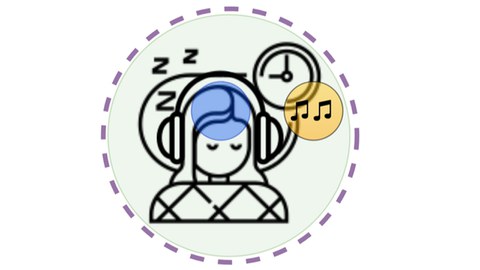Oct 17, 2022
Lullabyte project investigates the influence of music on the process of falling asleep
"Hush Little Baby" or “Brahms' Lullaby” lullabies are known throughout all cultures and times as an effective aid to falling asleep. This applies not only to children. Music exerts powerful effects on the human brain as evidenced by both subjective emotional responses and obvious changes in neurophysiology. So far, little research has been done on the tangible influence music has on the brain's transition from wakefulness to sleep, and whether it really helps people sleep better.
The MSCA Doctoral Network "Lullabyte" aims to fill this gap. Starting in November 2022, leading scientists from the fields of musicology, somnology, neuroscience, and computer science will investigate the connection between music and sleep in a consortium consisting of ten different European universities and companies. Dr. Miriam Akkermann, Junior Professor of Empirical Musicology at TU Dresden, is coordinating the network. "Musicology usually focuses on musical structures, cultural practices or historical contexts, while empirical neuroscience does not deal much with musical structures," explains JProf. Miriam Akkermann: "We want to change that with 'Lullabyte', and bring the disciplines together."
In Dresden, the question will be investigated whether there are musical characteristics that traditional lullabies and modern sleep/relaxing music have in common, and whether inferences about the effect of musical structures on sleep can be derived from this. For this purpose, the structure and emergence of widespread, so-called "sleep music" will be examined, and experimental research will be conducted on how selected musical pieces of this kind affect individual sleep quality.
Within the framework of "Lullabyte", a total of ten doctoral students will be trained in this interdisciplinary research area and acquire profound skills relevant for research, industry and the cultural sector. The PhD students, each based at one of the participating universities, are investigating the effects of music on sleep in very different settings and from different points of view. One of the research foci is the transition from wake to sleep states. "We are particularly interested in how the process of falling asleep and the sleep structure are changed by different types of music, and if we can identify musical features that are more helpful than others," describes Prof. Miriam Akkermann. "To this end, it is necessary that colleagues from musicology, neuroscience, psychology and data science work closely together." With the help of state-of-the-art neuroscience laboratories as well as special wearables, large sleep and music data sets are created and evaluated using machine learning strategies. Based on the research findings, also sound designs and new types of music are developed with the aim of creating sounds with a soporific effect. "We are looking for 'super lullabies,' so to speak," she said.
"Lullabyte" will train a new generation of interdisciplinary and internationally experienced researchers in order to provide the rapidly growing market of personalized, data-based generated music with both a solid scientific foundation and the personnel to strengthen Europe's position in such technologies. In addition to the practical training in the respective research projects, the network conducts joint summer schools and events in which industrial partners and artists impart doctoral students further skills in areas such as technology transfer, entrepreneurship, regulation of medical devices and public relations. In addition, all PhD students also complete a work phase at two other institutions in the network.
The network includes the TU Dresden, Radboud University Medical Center from the Netherlands, the University of Stuttgart, Aarhus University from Denmark, the FEMTO-ST Institute and the Paris Brain Institute from France, Universitat Pompeu Fabra from Spain, the Royal Institute of Technology from Sweden, Université de Fribourg from Switzerland and the Berlin-based start-up Endel, as well as several collaborations with industry partners across Europe.
The MSCA Doctoral Network is funded by Horizon Europe (HORZION) for 4 years. MSCA stands for Marie-Skłodowska Curie Actions and includes the EU's career support program for PhD students and postdocs in the field of excellence of HORIZON EUROPE.
The tendering for the 10 PhD positions will be issued beginning Nov. 1, 2022. For further information on the vacancies/open positions, please contact the partner institutions directly.
Contact
Jun.-Prof. Dr. Miriam Akkermann
Junior Professor for Empirical Musicology
+49 351 463 40 391
miriam.akkermann@tu-dresden.de


